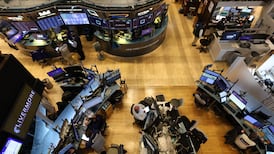Serious Money: Equity investors are engaged with an asset class that can provide strong positive returns in a volatile and high-risk environment.
The analytical community locks horns in trying to deploy investment metrics that provide surety for these investors. Price/earnings ratios (PERs) and dividend yields are some of the basic building blocks.
Far more esoteric measures have occasionally been employed, especially around the time of the tech bubble (1999-2000) when fundamentals were overstretched.
At times, it seems we analysts are competing to prove how superintelligent we are rather than providing solid and appropriate guidance.
This milieu lends itself to a quantitative slant. Detailed financial models, technical analysis and heavy valuation work are all weapons used to shoot silver bullets at the clients.
It reminds us of the debate within economics between econometricians and the Austrian school. The quant fans believe elaborate regression analysis of historic data generates valid predictions. The Austrians believe the more subjective concept of logical thought is the key to unlocking the future.
In equities, we agree, quantitative analysis too is a critical and necessary part of an analyst's kitbag but something else matters more than anything - management.
Analysing management teams is a highly subjective process. It is by definition nebulous and unsuited to "modelling". But, by picking and backing the right management teams, investors can produce strong returns.
In the attached table, we have picked out seven Irish companies that we think have excelled in management over the past 10 years.
We measure that excellence on the basis of share price performance and total shareholder return (including dividends). We then measure these results against the relevant peers of the individual companies.
Different sectors have share price cycles that are linked to the fundamentals of their respective industries. For example, a bank's share price is driven by factors that differ from those influencing an airline. Hence, we focus on relative sector performance instead of a straight comparison with index movements. The results show a group of companies that have sharply outperformed their industry peers.
Why is that? Static models could not have predicted this performance.
If you examined Kerry Group, for example, at any point during the 1990s it looked very "expensive" next to its peers if measured using PER, dividend yield or EV/EBITDA (enterprise value/earnings before interest, tax, depreciation and amortisation) multiples. Its original operating platform (butter, casein and agri-products) did not appear to offer much potential for profit growth.
The subsequent performance was delivered by a management team intent on facing down the challenges embedded in their sector (retail pressure, volatile input pricing, scale disadvantages, etc). It took vision, discipline and the bottle to take entrepreneurial risks.
The Beatreme deal in 1988 was, we think, the key inflection point in Kerry's history. That saw it take a change into an ingredients universe that provided sustainably high margins and growing profits. At face value, at the time of the Beatreme deal, it looked expensive using the prevailing investment metrics. But the management dealt with that by pulling a performance out of the business which was not apparent to the wider stock market.
Another example of such transformation is IAWS's purchase of Cuisine De France in 1997.That also looked like a wildly expensive deal at the time, but outside analysts could not see the "vision thing" which management correctly identified.
Other companies have built a management culture that systematically drives organic performance while identifying, completing and executing acquisitions that add value for shareholders.
CRH, Kingspan and Grafton stand out as having management teams with an attitude and focus that provides strong returns in sectors that seem, at first glance, pedestrian.
Their total shareholder returns suggest businesses providing proprietary market-leading products while operating in a high-growth industry, not typical construction and building materials territory. It is of note too that at CRH this culture has now become inter-generational, with successive chief executives delivering strong results.
Another example is in the airline industry, a sector littered with grand designs, apparently "cheap" valuations and perennial underperformance. Yet a focused management team can navigate through the challenges presented in such a cut-throat and volatile industry.
In the banking sector, Anglo Irish Bank has delivered an organic performance that resembles a high-flying technology company rather than a financial institution. A key conclusion here is that one element which cannot be modelled, calculated or built into an excel sheet - management - is crucial to performance. All this tells us that backing a winning management team can deliver very positive results.
For analysts, this is a tricky task. Because it is so subjective, and given that we are dealing with personalities rather than numbers, researchers must tread carefully. Reports containing subjective comments on a manager's performance is a formula for strained relationships and it can easily stray into waffley prose.
Those research reports should focus on providing the mechanical apparatus around analysis, composed of detailed commentary on strategy, markets and the relevant business model. That's the scaffolding.
The soft stuff, which in fact is critical to share price performance, must be handled more delicately.
For a professional investor, it is essential to take a view on the management team that takes charge of your money. Clues can be found in the historic performance of their companies, the longevity of respective management teams and messages about how each business intends to develop. After that, the gut instinct is a helpful ingredient.
The exercise is worthwhile though, because picking the right teams delivers significant absolute and relative gains for investors, especially over the medium to long term.
This article could have detailed a multiyear discounted cashflow model adjusted for cyclical trends with a currency-neutral twist. Our university lecturers might be impressed but investors should know better.
Joe Gill is research director with Goodbody Stockbrokers.










